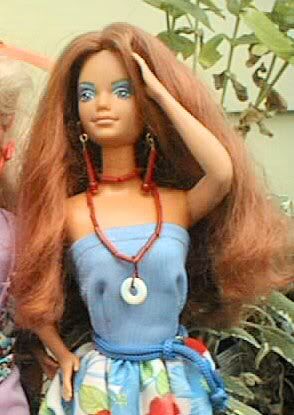
When I discovered The Danse Russe by William Carlos Williams, I thought I had discovered something, but it turned out to be something else. When I looked out the bedroom window to the house across the street, through the linden trees, it was just another house I saw across the street. I would play games that the middle son was in his bedroom across and through the trees, and I would pull the shades tight in some modesty that I thought I needed from his peeks of life through the trees.
Now, the windows are gone, the odd angle of the roof below where I peered to listen to the summer's hail and the ice dams of the winter, where I always thought that in case of fire I could cling to the ledge below and jump into the azaleas below, landing in a bed of furious pinks and reds and whites and purples, colors of the tropics against the dark red brick of the house.
Well the people that bought it when we sold it out from my mother, they have no care about the azaleas, or the halls wandered late at night, with the cold kitchen tile and the fake red tile on the floor. The way it felt to be a little ill and step into the colder tile of the black and white bathroom floor, reflected in the silvered mirror when you closed the door and pulled open the medicine chest to sit on the edge of the sink and examine your zits in the mirror to the drone of the tv in the living room. The way the blue and green setional couch hugged the walls between the room divider and the side of the fireplace. The way the beige carpet smelled when you stretched out on the floor at christmas to examine your new Vac-u-form. The old air conditioner that replaced one of the rose windows on either side of the fireplace over the couch. And the winters when you'd set the flue and pile the logs on, to lay on the carpet-covering brown goatskin rug, the shaggy one that the cat's always loved to knead. There was a way that the light fell upon it to make it look otherworldly, as if it were the pelt of a trophy hunter's pride, laid out on the hearth of the home like a grand prize, in front of the TV and the fire.
But the people that bought the house stripped it bare, ripped of the second floor and stuck up new sticks. My blue bathroom is gone, along with the closet where I left my old transistor radio, the red one. The room under the eaves that smelled of dust and the toys we stored in there when we no longer played with them, the toys I dragged out last summer, still in stale cardboard boxes, to leave in the basement of my own house now. What kind of careless people would tear down brick and put up plastic, cover the warm brick where I found the handprint of a mason from the 1920's with plastic siding, as if that were an improvement?
I look at vintage photos now, and see brick houses with the windows decorated like battlements in brick, and wonder what souless people could do that to a house, cover it with plastic siding and tear it apart, leaving the shrubs rootless in the yard, the front steps chipped and chiseled and discarded for the dumpster where I sat and sold lemonade and watched other kids on their bycycles, held the door open for my own daughters on hot summer days, or pushed the mechanincal doorbell to summon my mother to let us into her house, me and my horde of tired kids on halloween, for thanksgiving dinner. When I drove by, I thought of the shock of seeing my grandmother's house in Jersey City was gone. As if the world has a vacancy that can never be filled again. That's what my kids will think. No one will ever look out that picture window in the front and move the curtains aside with a wave of a hand at them. The window itself is gone, the shrubs my mother so tenderly cut and shaped for all those years, the radiator that was in the way so you could never look straight out, but so that you could lean your elbows to hold your head and peek and hide from the strangers at the front door if you wanted to. The window where I watched boyfriends drive off into the night, and cars come and go. Where I heard Trixie the dog barking, and Shadow, where my Ignatz cat sat and surveyed the grass outside and jumped out of sight to greet me at the back door when I arrived home.
What a world our homes are, from the trinkets in the windows and the view of the universe we see from them, the pine tree in the yard, the lindens as they grew old and died, the wavering light of summers and winter snow and the hurricane when the dead trees were scattered and fallen across the street the entire block and how odd the light seemed afterwards. How odd it was to see sky and not trees and how bright and unnatural and naked. Now the sky is open, the roof is open and green grass that still pokes up in the winter is harsh beneath the dumpster and the uprooted shrubs. I want to drive by in the dead of night and see the darkness of the place of my childhood. But it is gone. The world is gone. Left to haunt my thoughts at four in the morning in my cold house, a world I can only hold inside for this brief time, until I too am gone. And someone takes my bones and covers them with plastic, like the brick house, and hides them from sight as something unneeded, ugly and old.
And the place most familiar, the things touched in the dark and remembered, fade and are gone forever to nothingness. Time is evil.

